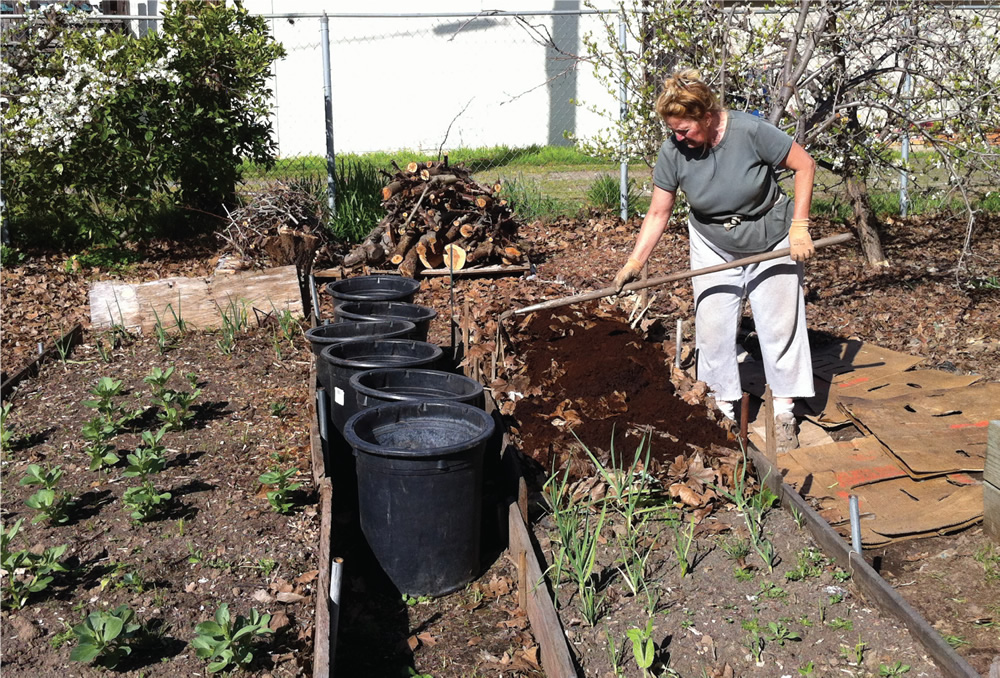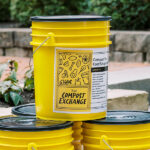“Farm-to-Fork-to-Farm” is the basis for ReSoil, which collects food scraps by bicycle and brings them to community gardens for composting.
Michelle Burwell
BioCycle June 2015
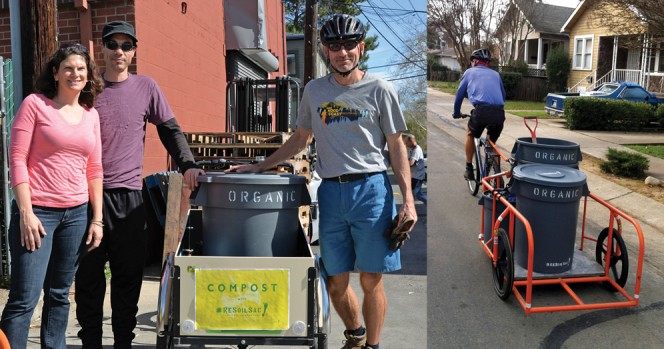
ReSoil cofounders David Baker (left) and Scott Thompson (right) stand with Julia Thomas in front of their bicycle trailer designed to transport 32-gallon barrels of food scraps (right) to community farms and gardens across Sacramento.
Everyday Scott Thompson, program director of ReSoil Sacramento, along with a half-dozen volunteer cyclists, bike 32-gallon barrels filled with food scraps to community farms and gardens for composting in Sacramento, California. While the pedal-powered community composting network began, ostensibly, just 10 months ago, the Sacramento program is actually the result of an idea that’s been evolving for over five years.
It started in 2010 when GRAS (Green Restaurants Alliance Sacramento) began a pilot composting program with 12 local restaurants willing to divert their food scraps. However pickup was expensive and in 2013, GRAS had to end the collection program after CleanWorld opened an anaerobic digester at the South Area Transfer Station. The 12 participating restaurants began diverting their food scraps to the digester, which produces a vehicle fuel from the biogas.
But in June 2014, struck with a renewed sense of fortitude for completing the local food cycle, David Baker and Scott Thompson cofounded ReSoil. In 2012, “Sacramento declared itself the ‘Farm-to-Fork Capital,’” said David. “So it’s not that far of a stretch to completing the food loop, ‘Farm-to-Fork-to-Farm.’” And whether it was simply timing or luck, this second go-round resonated with the Sacramento community.
Baker and Thompson began by reexamining the most efficient and clean ways to get food scraps back to soil. The pair wanted to complete the cycle using bicycles, since fuel emissions felt counterintuitive to what they were doing. Before formally launching ReSoil, they set out to determine how much compost they could actually produce. The pair approached Hot Italian, a local restaurant, and asked to use its Earth Tub composter to test the concept. While the owners of Hot Italian had originally used the Earth Tub for their own composting, the restaurant’s scraps were too protein-heavy, and they were happy to see ReSoil take it over.
Once ReSoil recognized its composting potential, Baker and Thompson began soliciting local food producers to set aside their preconsumer scraps. It was a process that many restaurants found easy to do. It required no more energy than if they were to simply toss the scraps in the trash.
ReSoil provides participants with 32-gallon barrels and picks up scraps one to six times a week, depending on the amount of scraps each food producer generates.
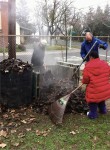
Three-bin composting systems are installed at community gardens. ReSoil assists with composting education.
The program spread quickly, and today ReSoil collects preconsumer scraps from over 20 participating local restaurants and food producers, which include community collection spots at local farmer’s markets. For example, at the Saturday Midtown Farmer’s Market, ReSoil picks up an average of 150 lbs of food scraps each week.
Organics Distribution
ReSoil’s cyclists then distribute the scraps to over a dozen community farms and gardens. Their trip from food producers to composters lies roughly within a 3.5-mile radius. In the first 10 months, the team successfully diverted over 100,000 lbs of food scraps away from the landfill. Prior to the implementation of ReSoil, most of Sacramento’s community gardens had installed 3-bin systems for composting, but Baker and Thompson soon found many struggled to manage the system productively or efficiently. Composting education and engagement quickly became a major component of ReSoil.
Currently an average of 20,000 lbs/month of food scraps is being diverted. While ReSoil is relying on suggested donations from participating food producers to maintain the operation, the team hopes to develop a more formal, fixed collection fee in the future.
ReSoil quickly discovered that composting capacity was not the limiting factor in its operation. They were limited by the number of participating food producers — and people power to do the collection and distribution to the gardens and farms. “Our experience is that there is demand for every food scrap that we can procure,” explains Baker. “With enough manpower, the composting potential
is boundless.” To strengthen that manpower, ReSoil commissioned a custom made trailer for hauling the scraps. The trailer unhooks from the bike and acts as a wheelbarrow, so that volunteers can wheel the scraps right up to the composting bins.
ReSoil has found the city of Sacramento to be especially suitable for its initiatives. Perhaps most importantly is the fact that the city’s climate and landscape are nearly perfect for composting. “The main distinction about community composting in our city is that it’s relatively easy,” Baker adds. “When we look at the geography and weather our counterparts elsewhere deal with in order to divert organics, we can only conclude that there’s simply no excuse not to be doing this in flat, mild Sacramento.”
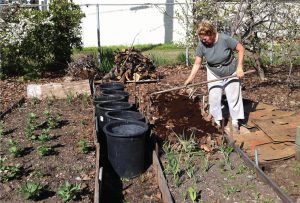
Adding compost to the gardens helps with water infiltration and moisture retention. “When it rains, you want to soak up every drop that does fall, and compost does that,” says Scott Thompson.
Because the effects of climate change differ from region to region, ReSoil emphasizes the many characteristics of composting that specifically benefit drought-stricken areas such as Sacramento. “When it rains, as rare as it is these days, you want to soak up every drop that does fall, and compost can do that,” Thompson notes. “We want to make Sacramento less like Teflon and more like a sponge.”
Engagement and enthusiasm from the local community also has contributed significantly to ReSoil’s success. And ReSoil’s initiatives will likely gain more momentum, thanks to a citywide urban agriculture ordinance that was passed by Sacramento City Council in March (2015). The ordinance enables residents to sell food (with a few exceptions) in their front yard that they have grown in their backyard.
The ordinance incentivizes landowners by providing them with a new, potential source of income and also offers tax incentives to those who allow their properties, including vacant lots, to be turned into minifarms. “There’s a strong contingency for urban agriculture that is working to turn vacant lots into food bearing gardens,” explains Bill Maynard, City of Sacramento’s Community Garden Program Coordinator. “Since we can grow all year round here, that’s a plus for those who want to get their hands dirty.”
The ordinance aims, in part, to bring fruit and vegetables to neighborhoods with little access to fresh produce. But ReSoil also recognizes this ordinance as new potential for composting scraps. With more residents tapping into farming and gardening as an entrepreneurial endeavor, Thompson and Baker hope ReSoil will see these new growers participating in the benefits of local composting, too — which will help Sacramento earn that title of Farm-to-Fork-to-Farm Capital.
Michelle Burwell is a freelance writer and journalist based in Chicago.


